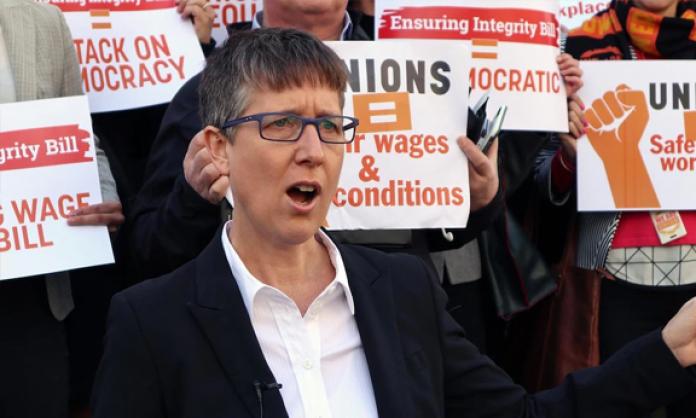On her appointment to the position of ACTU secretary 12 months ago, Sally McManus lost no time in making a splash.
On the day she stepped into the role, she appeared on the ABC’s 7.30 and told interviewer Leigh Sales, “I believe in the rule of law when the law is right. But when it’s unjust, I don’t think there’s a problem with breaking it”.
With those two dozen words, McManus sent the conservatives and bosses into fits of rage. Rage at the very idea that unions might break the law by stopping work to save a worker’s life on a construction site. Rage at the presumption that workers have the right to defy oppressive laws made by well-paid politicians, bureaucrats and judges who never face the dangers confronted by workers every day.
But if the right wing reached for invective, thousands of unionists cried “At last!”. After a string of grey nobodies at the head of the ACTU, McManus seemed like a breath of fresh air.
Since that first interview, McManus has travelled the country widely, attended numerous picket lines and union meetings and hammered home her argument that the rules are broken, that neoliberalism has to be rolled back and that things have to change. Her speeches have struck a more defiant tone than we have heard from the ACTU for many years, and she has clearly enthused many in the union movement.
In the mainstream
But we have to be blunt. McManus may throw some fighting rhetoric into her speeches, but she does not represent a break from the dead-end strategies pursued by the mainstream of the union movement over the past three decades.
McManus herself is keen to emphasise the continuity with her predecessors. She described Bill Kelty, ACTU secretary from 1983 to 2000 and architect of enterprise bargaining – the system that has resulted in today’s wages drought – as “a master strategist and once in a generation fighter”. She was right in one sense. If Kelty found himself in one fight every 30 years, he thought that was more than enough.
McManus has spent her entire life after university within the bureaucracy of the trade union movement and knows not to ruffle feathers. She backed the SDA when it was criticised for its notorious wage-cutting deals with the big retailers, deals that scandalised even the mainstream media. And her criticisms of the Fair Work laws invariably omit any reference to the fact that they are Labor’s laws.
Unions pushed back
There has been no let-up in the employer offensive since McManus took office.
Wage increases in enterprise agreements are running at their lowest level on record and on current rates will fall below inflation in the next 12 months. Coverage of enterprise agreements is sliding.
The bosses have succeeded in imposing savage attacks on groups of workers. At Griffin Coal in Collie, WA, miners were forced to cop a $40,000 annual pay cut after a lengthy lockout. After a lockout lasting many months, coal miners at Glencore mine in Oaky Creek in Queensland are faced with returning to work on terms they have already rejected twice.
At Streets Ice Creams in western Sydney, the company reduced workers’ conditions after threatening to rip up the enterprise agreement. The bosses at the Myrtleford ply mill in rural Victoria crushed the workforce after an 11-week lockout.
At Fletcher Insulation in Melbourne, the bosses inflicted serious damage to workers’ conditions after a three-month strike. Workers at Exxon Mobil in Gippsland have now been on strike for more than eight months, and there is no end in sight. Meanwhile, staff at 7-Eleven stores, Caltex franchises and Hungry Jack’s are being robbed blind. The Fair Work Commission, far from being an “independent umpire”, cut penalty rates and banned the NSW railway workers from going on strike.
There have been some precious wins – most recently at Australian Paper in the northern suburbs of Melbourne, where workers struck for seven weeks to roll over their enterprise agreement – but they are far outnumbered by the defeats our side has suffered.
#ChangetheRules
What is McManus’ answer to the employer offensive? #ChangetheRules, now the subject of a major advertising blitz. This is simply a rehash of the Your Rights at Work campaign against the Howard government’s WorkChoices laws, which did nothing to halt the employer attacks at that time. Now, as then, the campaign involves throwing the resources of the union movement into a marginal seats campaign to toss out an incumbent Coalition government in the hope that an incoming Labor government will deliver pro-worker industrial reforms.
But what has Labor actually promised thus far in the way of changing the rules? Reversing the cuts to penalty rates will make a difference to workers in hospitality and retail. But, beyond that, Labor’s promises are thin indeed. Possibly we will hear more at the ALP national conference in July, but the only other changes that have been floated so far, no more than thought bubbles at present, are more restrictions on the ability of employers to apply to terminate enterprise agreements or to introduce sham agreements voted up by only a handful of workers, registration of labour hire providers and greater powers for the Fair Work Commission to intervene in intractable disputes.
Labor has made no commitments to doing anything that would strengthen workers’ ability to strike and, in particular, to carry out solidarity action, the single legal reform that would do most to turn the situation around. Indeed, more powers for the commission will only give it a greater ability to stop strikes, as it did with the NSW railway workers in January and at Qantas in 2011.
Labor’s reluctance to rip up its own Fair Work laws is hardly a surprise. Bill Shorten is no Bernie Sanders or Jeremy Corbyn, figures frequently referenced by McManus. As Workplace Relations minister between 2011 and 2013, Shorten was responsible for the Fair Work laws and, as national secretary of the Australian Workers Union prior to that, made a name for himself signing off on shoddy deals with bosses.
Militancy
#ChangetheRules gets things arse about. The current rules simply reflect the balance of power between the capitalists and the workers: they are written in such a way as to box us in precisely because our side last waged a serious battle against the bosses nearly four decades ago. There is no prospect that the rules will change in any significant way without a serious industrial campaign by the union movement. That is the lesson of the entire history of the union movement. McManus is well aware of this history, but what we’ve seen so far of #ChangetheRules points in completely the opposite direction.
Of course the government, the bosses, the courts and the commission would hit the roof if the unions seriously challenged the law through direct action. They would threaten the union involved with millions of dollars in fines. But the unions are paying huge fines anyway – $3 million in 2017 alone. They’re being penalised hundreds of thousands for infringements that are often laughably trivial – like the 10-minute stoppage at a construction site in Melbourne.
Refusing to organise collective defiance of the law is not saving the unions from massive fines and potential bankruptcy. It is just ensuring that the union movement loses most battles, as isolated groups of workers are worn down and broken by bosses confident that they will suffer no cost for doing so. “One day longer, one day stronger” is not a strategy to win.
It’s also true that unions are in many cases failing to undertake even the most basic action that falls well within the laws, including cutting short strikes without any commission order to do so. By putting the emphasis on a marginal seats electoral campaign, #ChangetheRules is a substitute for the kind of organising work required to build union strength in the workplace.
We do not have the luxury of a repeat of the Your Rights at Work campaign. Our movement is in a worse state than it was a decade ago, and unionism has been pushed into virtual irrelevance in a string of industries since then. We need to go back to our history long before the Howard government and before the Hawke and Keating governments, so beloved by today’s union leaders, to recover the spirit of industrial militancy that built the unions before and can do so again.
----------
Tom Bramble is author of “Our unions in crisis. How did it come to this?” in the Summer 2018 edition of Marxist Left Review, http://marxistleftreview.org.











